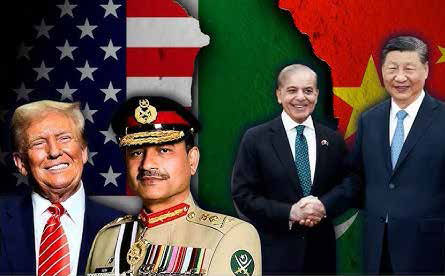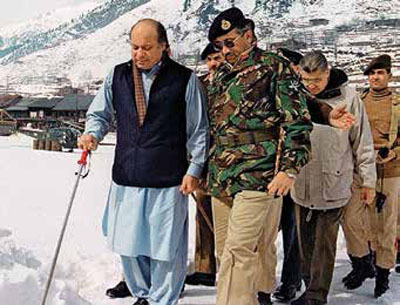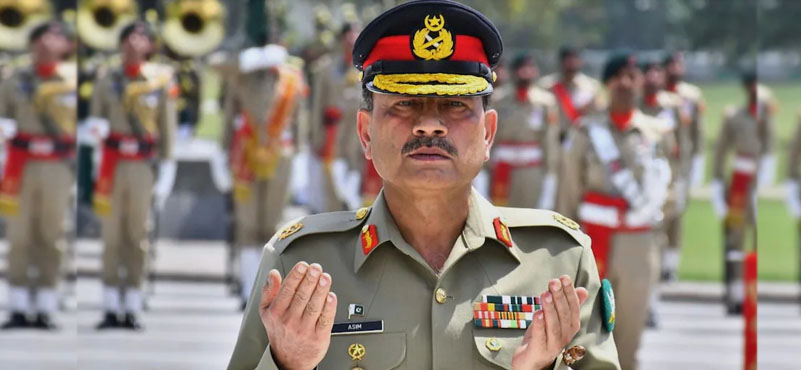Pakistan’s army chief, Asif Munir’s nuclear sabre-rattling is causing alarm bells to ring in New Delhi’s Executive Enclave, the new address for the Prime Minister’s Office and the Cabinet Secretariat. How credible are his threats? Where is Pakistan heading under his charge?
A recent New York Times article was titled ‘Pakistan’s Most Powerful Man Steps Out of the Shadows.’ That was in the context of army chief Asif Munir’s invitation by US President Donald Trump for lunch in the White House; no other Pakistan army chief has been given that honour, that to, while serving under a civilian government. He then made his second visit to the US where he threatened to launch a nuclear war against India and take down “half the world.” That he made those outrageous remarks on US soil signals a new phase in Pakistan’s strategic signalling, not to India but also the rest of the world. His diatribe included threats to India’s economic assets, including, specifically, the Jamnagar refinery owned by Reliance, the world’s biggest such site and one of India’s most profitable enterprises. The remarks were the first nuclear threats known to have ever been delivered from US soil against a third country.
India may have shrugged off his threats as ‘nuclear sabre-rattling” but India has cause to worry. South Block is convinced he was the mastermind behind the Pahalgam attacks that eventually led to a limited conflict, Operation Sindoor by India’s armed forces. In a country long dominated by its military, the ascent of Syed Asim Munir marks a pivotal moment in Pakistan’s political and security trajectory. He is only the second army chief to be promoted to the rare five-star rank of Field Marshall, the first being Ayub Khan, the military chief who staged a coup after declaring martial law, and appointed himself President and Field Marshall. He is remembered for starting the 1965 war with India after infiltrating armed volunteers into Kashmir.

In contrast, Munir’s promotion to Field Marshall came in the wake of “Operation Bunyan-um-Marsoos”, Pakistan’s military response to India’s military strikes on terrorist bases and military installations. The phrase is used to describe those who fight in the cause of Allah as a “bunyanun marsous,” translating into unity and strength in battle. Despite India’s assertion that it was Pakistan’s Director General of Military Operations (DGMO) who called his Indian counterpart, Lt General Rajiv Ghai, pleading for a ceasefire, Munir managed to project the conflict to his domestic audience as a victory for Pakistan, where he was widely hailed as a hero. That led to his promotion as well as confirmation that he has emerged as the most consequential figure in Pakistan today, with influence extending well beyond the barracks. Analysts often describe him as the de facto leader of Pakistan, with parliament, the presidency, judiciary, and media seen as operating within parameters set by GHQ Rawalpindi.
His main opponent or political threat comes from former prime minister Imran Khan and his PTI party, but their open hostility poses no danger currently with Khan currently in jail on multiple charges which he is fighting in the courts. On 7 April 2024, Khan, speaking to reporters while incarcerated, claimed that there was a conspiracy to assassinate him during his imprisonment and implied that “his fate was in the hands of Gen. Asim Munir”. Khan as prime minister, had removed Munir from his post as ISI chief in 2019, beginning a highly acrimonious battle between the two. Munir has been touring the world trying to portray himself as representative of the civilian government which many see as humiliation for Prime Minister Shehbaz Sharif and President Asif Ali Zardari.

Munir has also said Pakistan could target any dams built by India on cross-border rivers after suspending the Indus Waters Treaty and that India is like a “shining Mercedes” and Pakistan “a dumper truck full of gravel”. He added, “If the truck hits the car, who will be the loser?” He said this at a conclave attended by Pakistan’s diaspora where the theme was “Global impacts of Pakistan’s military and diplomatic victories over India.” Such hyperbole is typical of the man, but also seen as dangerous war-mongering. He also repeated the “jugular vein” remark on Kashmir he had delivered just before the Pahalgam attack. That he has managed to get into President Trump’s good books is a charm offensive that played to the US President’s fragile ego: a letter recommending Trump for the Nobel Peace Prize for stopping the war between India and Pakistan along with pledges to be a reliable protector of American interests in Afghanistan and Iran. He also claimed credit for helping America track down the head of the Afghanistan-based terrorist group that was behind the suicide bombing at Kabul airport during that country’s chaotic withdrawal from Afghanistan in 2021 in which 13 US military personnel died. The diplomatic outreach also included access to Pakistan’s unproven oil assets. Pakistan is already heavily involved in the Trump family’s crypto dealings.
A former Pentagon official has described Munir as “Osama Bin Laden in a suit.” Michael Rubin, now a senior fellow at the American Enterprise Institute, added that: “There is no amount of concessions given to Pakistan that can change the ideology of an Asif Munir.” That ideology is the most dangerous aspect of Munir’s threats and bluster. He is an Islamic fundamentalist who knows the Quran by heart and often quotes from it. He also prays five times a day, a fundamental Islamic practice called Salat or Salah, a pillar of faith that fosters submission to God. These ritual prayers include recitations from the Quran. “God has made me protector of the country. I am a soldier and my greatest desire is martyrdom,” he has been quoted as saying. Chilling words from a man whose finger is on Pakistan’s nuclear button. He is the first army chief after General Zia-ul-Haq to invoke Islamist nationalism and even wear it as a badge of honour. Experts believe that Munir is trying to establish himself as ‘Super President’ using what Pakistan calls the ‘4A’ policy (Army, Allah, America and Atom). While Pakistan army leaders in the past have also worked on the same lines, Munir’s emphasis on ‘Atom’ has drawn the attention of the world.
His family spent time in Jalandhar in India after Partition before moving to Pakistan. He joined the army and rise rapidly through the ranks, becoming the director of military intelligence in 2016, followed by the director general of Inter-Services Intelligence (ISI), one of the most powerful military roles, in 2018. He maintained a relatively low profile till his clash with Imran Khan, and now, has expanded his reach after the limited conflict with India in May during which hyper-nationalist fervour gripped Pakistan, which led to the military has been back in favour, with Munir projecting himself as the only one standing up to India. He is the first army chief after General Zia-ul-Haq to invoke Islamist nationalism and even wear it as a badge of honour.
Vikas Swarup, the Indian diplomat/author, believes that “Pakistan is now trying to position itself as the ‘Crypto King’ of South Asia, and there, through World Liberty Financial, in which Trump’s family has stakes, Steve Witkoff’s (Trump aide and US Envoy to the Middle East) family has a stake, through that I think Pakistan has managed to project an image of itself as a reliable partner…All these things have led to Trump having a softer approach towards Pakistan. “I think the (United States’) relationship with Pakistan right now is a very tactical one and is a short-term one, primarily motivated by the financial gain that the Trump family and Witkoff family hope to make from the cryptocurrency assets in Pakistan. With India, I think, the relationship is much more strategic. It is not so transactional as it is with Pakistan. That is why I feel that it is a passing phase. I call it a storm, not a rupture. You just have to wait out the storms. All storms eventually pass,” he said.
That may well be but America’s strategic shift in favour of Islamabad is disturbing and requires a measured response. The threat lies in the fact that Munir may be emboldened to take provocative actions against India, convinced that China’s military and diplomatic support, as visible during Operation Sindoor, and perceived backing from Washington tilt the balance in Pakistan’s favour.
 Edward Price, senior non-resident fellow at New York University, said that India has the potential to become “the most substantial and influential country in the 21st century” and could decide the outcome of any future US-China confrontation, but Washington under President Donald Trump is failing to build that partnership.
Edward Price, senior non-resident fellow at New York University, said that India has the potential to become “the most substantial and influential country in the 21st century” and could decide the outcome of any future US-China confrontation, but Washington under President Donald Trump is failing to build that partnership.
Former UN diplomat and now Congress party MP Shashi Tharoor pointed out that: “It’s not the bomb itself that poses the gravest danger, but the hand that hovers over the button. Today, that hand belongs to “Field Marshal” Asim Munir, a man whose rhetoric is not merely bellicose but openly sectarian, divisive and bigoted. In statements one can hardly imagine being uttered in the 21st century, Munir posits the impossibility of Muslims living in a non-Muslim majority India to justify his claim that Muslim-majority Kashmir is the “jugular vein” of Pakistan. His intention was to stoke hatred of India and of Hindus, and to justify Pakistani belligerence. But to suggest that Muslims cannot live in a non-Muslim majority country was all the more preposterous for being made to a Pakistani diaspora audience living in the United States, a non-Muslim majority country!”
 India has meanwhile chosen to restrain its criticism of Trump’s additional tariffs for buying Russian oil while sending out the message that it is acting in the interests of its citizens. It has also hired a second lobbying firm in America to promote its voice and interests. On the diplomatic front, it has worked to ease tensions with China and deepen ties to Russia, which has further upset Washington. As T. V. Paul, Distinguished Fellow at McGill University and author of The Unfinished Quest: India’s search for Major Power Status from Nehru to Modi, wrote recently: “Indian foreign policy has withstood decades of US pressure. To ensure it can withstand current pressures, India must use this moment to build domestic strength and emerge as a truly indispensable global player.” That is precisely what Prime Minister Modi has said in his recent speeches, and that is also what Munir is trying to undermine with the backing of China, and now, Trump. What the foreign office, the PMO and the defence ministry are currently concerned about is the possibility of Munir undertaking a Kargil-type misadventure to fulfil what he believes is his destiny, to lead Pakistan to a military victory over India. Many generals before him have tried, and failed, or been forced to surrender as in 1971. Munir believes fervently that Allah is on his side, as are Beijing and now Washington. For New Delhi, these are challenging times and the threats emanating from Munir, who unofficially heads the world’s only Islamic nuclear power, is only adding to the pressure.
India has meanwhile chosen to restrain its criticism of Trump’s additional tariffs for buying Russian oil while sending out the message that it is acting in the interests of its citizens. It has also hired a second lobbying firm in America to promote its voice and interests. On the diplomatic front, it has worked to ease tensions with China and deepen ties to Russia, which has further upset Washington. As T. V. Paul, Distinguished Fellow at McGill University and author of The Unfinished Quest: India’s search for Major Power Status from Nehru to Modi, wrote recently: “Indian foreign policy has withstood decades of US pressure. To ensure it can withstand current pressures, India must use this moment to build domestic strength and emerge as a truly indispensable global player.” That is precisely what Prime Minister Modi has said in his recent speeches, and that is also what Munir is trying to undermine with the backing of China, and now, Trump. What the foreign office, the PMO and the defence ministry are currently concerned about is the possibility of Munir undertaking a Kargil-type misadventure to fulfil what he believes is his destiny, to lead Pakistan to a military victory over India. Many generals before him have tried, and failed, or been forced to surrender as in 1971. Munir believes fervently that Allah is on his side, as are Beijing and now Washington. For New Delhi, these are challenging times and the threats emanating from Munir, who unofficially heads the world’s only Islamic nuclear power, is only adding to the pressure.
ABOUT THE AUTHOR
 Dilip Bobb is a former senior managing editor, India Today (1975 -2010), and Group Editor, Features and Special Projects, Indian Express (February 2011-October 2014)
Dilip Bobb is a former senior managing editor, India Today (1975 -2010), and Group Editor, Features and Special Projects, Indian Express (February 2011-October 2014)








